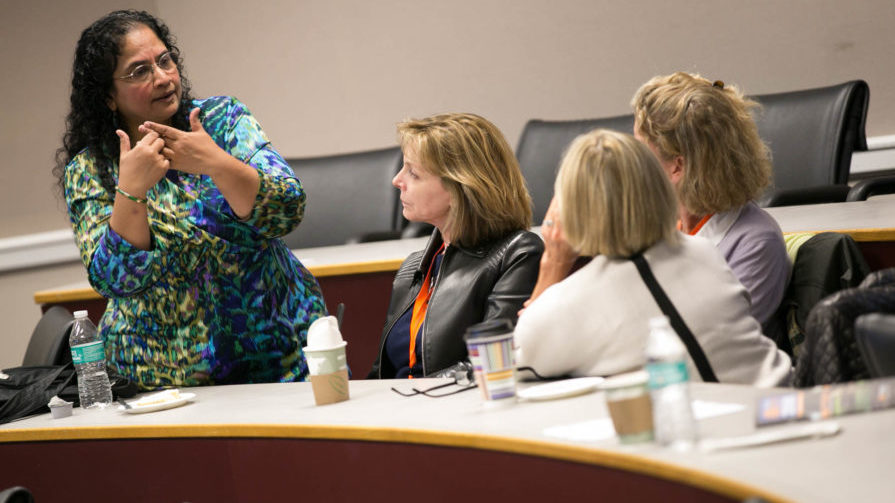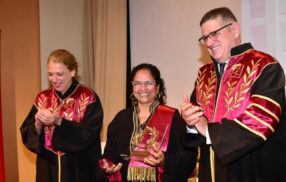
The Growing Global Reach of Darden Ideas on Entrepreneurship Sparks the Year of Effectuation
By Dave Hendrick
Brazilian entrepreneur Helena Casanovas Vieira was recently in the Washington, D.C., area for a conference on social entrepreneurship and made a point to detour to the University of Virginia Darden School of Business.
The co-founder and human development director at the Brazil-based nonprofit Aliança Empreendedora, or the Entrepreneurial Alliance, wanted to visit the unofficial home of effectuation — the set of ideas that changed how her organization helps tens of thousands of low-income micro-entrepreneurs across Brazil.
The interest from a group like Aliança Empreendedora is just one indication of the growing power of entrepreneurial ideas at Darden, a school where entrepreneurship and venture creation have become leading strengths — the culmination of years of effort on the part of many.
As the entrepreneurship scene blossoms at Darden, UVA and Charlottesville, effectuation is one of the prime Darden-born ideas finding enthusiastic converts in all corners of the world.
The accessible and flexible approach to entrepreneurial logic uncovered by Professor Saras Sarasvathy gives would-be entrepreneurs easy-to-understand tools to navigate the uncertainty of the venture creation environment. The five principles of the deceptively simple framework are influencing the work of entrepreneurs, academics and incubators across the world.
Darden Ideas Go Global
So how did an idea morph into a movement?
“Somehow, the validity of the research and the rich texture of the material combined to give it an extra boost inside academia,” Sarasvathy said. “Then, when we took that to practice and teaching, because of the richness of the data and the stories, they took fire very easily. It was much more accessible academic research.”
Sarasvathy’s shelves are lined with books about effectuation authored by others. There’s a book from a French author who runs a popular online course on effectuation. Another is by a German author who has developed a program in Germany for teaching entrepreneurship via effectuation to refugees — it was deemed the best management book of the year when published, Sarasvathy said.
An author of a Dutch book has just started teaching the practices to the Netherlands-based multinational Rabobank. A book published in Denmark shares the stories of student entrepreneurs at Copenhagen’s Aarhus University, and how each one has used effectuation principles for venture creation.
Sarasvathy recently heard about separate papers about effectuation for R&D managers and social media.
“People are doing things that sometimes I have no idea about,” Sarasvathy said. “I never know what’s going to pop up in my inbox.”
Many discover the concept through the website of the Society for Effectual Action, an organization supported by Darden’s Batten Institute for Entrepreneurship and Innovation. The site serves as a central hub for researchers, educators and entrepreneurs and arms them with the tools they might need to create ventures or further the concepts of effectuation.
“People who just want a couple of tools in building a venture — they can find something. People who want to teach can find something. People who want to challenge the ideas — any ideas that have to do with entrepreneurship today — they can go back and forth,” said Sarasvathy. “A lot of researchers like to argue.”
The site fulfills part of Sarasvathy’s goal to teach entrepreneurship to all, ideally making the concept as common as science or math for students. Sarasvathy wants people to view entrepreneurship not as “the ultimate backup option,” but as a means for better living.
“The beauty of entrepreneurship is everybody in life has to brush up against it,” Sarasvathy said. “We are all going to encounter entrepreneurship, and the issue is to see this as a tool to build a better future for ourselves, whether individually or as a society.”
The fervor around effectuation and entrepreneurship is such that Sarasvathy finds herself increasingly declining invitations to discuss her work at conferences or events, although opportunities to address educators, particularly those outside of the U.S., are often difficult to pass up.
Sarasvathy even recently introduced the concepts to attendees of a creative services conference in Las Vegas, after which participants presented proposed ventures to entrepreneurs Kevin Harrington and Daymond John of Shark Tank fame.
“From Day One, I came to Darden to do this because this was the only place where I felt that I could do research, teaching and practice, and they could all feed off of each other in a positive way and all of it was valued,” said Sarasvathy. “That’s one of the most wonderful things about Darden.”
Darden’s Entrepreneurial Ecosystem
Sankaran “Venkat” Venkataraman, Darden’s senior associate dean for faculty and research, said Darden has always had faculty and students interested in entrepreneurship, but it became a clearer focus of attention for the School upon the formation of the Batten Institute in 2000.
“That was a transformational event for the School, and we’ve gone from strength to strength from there,” Venkataraman said. “To a point where I would say, today, we are a leading school and entrepreneurship is in the air both at Darden and in the broader community.”
Spurred on by the Batten Institute, Venkataraman said a combination of “professors, subjects, ideas, the local ecosystem, the W.L. Lyons Brown III i.Lab and the venture capital environment” coalesced into a tipping point around 2010. Today, the Batten Institute itself supports the work of a number of leading professors in the area of innovation and entrepreneurship, including Raul Chao, Ed Hess, Jeremy Hutchison-Krupat and Mike Lenox. Meanwhile, Professor Greg Fairchild has blazed trails in entrepreneurship skill-building for disadvantaged groups and Jeanne Liedtka is advancing design thinking as a means for innovation.
As Batten continues to make good on its vision to become a leading center for the creation and dissemination of knowledge in the fields of entrepreneurship and innovation — both within companies and in new ventures — the institute is closely associating itself with effectuation, calling it one of the most powerful ideas in the field of study.
The year ahead will be filled with entrepreneurship competitions, conferences and thought-leadership events, and Batten plans to formally declare 2017 “The Year of Effectuation.”
A New Way Forward in Brazil
Vieira’s organization has long offered business support to micro-entrepreneurs, but she said the traditional approach to entrepreneurship, with a focus on business plans and forecasts and pricing structures, showed middling success with the nonprofit’s clients. Then in 2012, Vieira came across the concept of effectuation, with its implied messages of empowerment and focus on the entrepreneur first and venture second, and the lightbulb went off.
“We threw away all of our methodologies and we built everything with this theoretical basis,” Vieira said during her recent trip to Darden to meet with Sarasvathy. “We changed the focus. We want to see how the entrepreneurs are developing — not the business. If the business comes together, that’s awesome, but it’s not the focus.”
Vieira, whose organization has supported more than 30,000 entrepreneurs across 21 states in Brazil, said effectuation’s core message has been particularly well-suited to her mostly low-income clients, who generally start their businesses using modest resources.
“We now work helping them to find who they are, the people they know and the things they already know in order to start a business,” Vieira said.
Vieira said the decision to travel to the spiritual home of effectuation was an easy one.
“I thought it would be awesome, because we talk a lot about Saras,” Vieira said. “Her picture is in all of our materials.”
The Making of a Venture
Teddy Jones (MBA ’12) in many ways represents the newer wave of Darden entrepreneurs: someone who came to the School with a vision for starting a company and then used the specialized instruction and dynamic environment to attempt venture creation, even if that meant accepting periodic failure and letting go of his initial vision.
Although he “fully committed” to the entrepreneurial process at Darden from the start, Jones, a two-time participant in the i.Lab incubator program, said it wasn’t until his Second Year that he was able to start putting the pieces of successful entrepreneurship together, when “everything started clicking and I started seeing opportunities where I didn’t see them before.”
Jones and classmate Jon Carrier (MBA ’12) founded 501 Auctions, a fundraising platform for nonprofit organizations that now employs more than 65 people and has sought no outside investment beyond the incubator program stipend.
“We drank the Darden entrepreneurial Kool-Aid, which is all about effectuation and making use of the resources at your disposal and really plunging into it without risking more than you can afford,” said Jones. “I don’t think that I or my co-founder would have approached it that way — taking small bets and going in the direction of what people wanted — were it not for our experience at Darden and the wisdom imparted by folks like Saras Sarasvathy and Jeanne Liedtka.”
Jones also associates the venture environment at the School with attributes that are not always associated with the demanding and potentially high-stakes world of venture creation, saying Darden helped him and his partner achieve their goals in part due to the overwhelming warmth and positivity of the atmosphere.
“You will seldom find yourself in an opportunity like this where there is that much care and energy in the room,” Jones told an audience of new First Years at a career discovery forum in August. “It is such an incredible place to embark on an entrepreneurial journey and one of the few times where you will have the energy and resources at your disposal to commit to it fully.”
The University of Virginia Darden School of Business prepares responsible global leaders through unparalleled transformational learning experiences. Darden’s graduate degree programs (MBA, MSBA and Ph.D.) and Executive Education & Lifelong Learning programs offered by the Darden School Foundation set the stage for a lifetime of career advancement and impact. Darden’s top-ranked faculty, renowned for teaching excellence, inspires and shapes modern business leadership worldwide through research, thought leadership and business publishing. Darden has Grounds in Charlottesville, Virginia, and the Washington, D.C., area and a global community that includes 18,000 alumni in 90 countries. Darden was established in 1955 at the University of Virginia, a top public university founded by Thomas Jefferson in 1819 in Charlottesville, Virginia.
Press Contact
Molly Mitchell
Associate Director of Content Marketing and Social Media
Darden School of Business
University of Virginia
MitchellM@darden.virginia.edu




